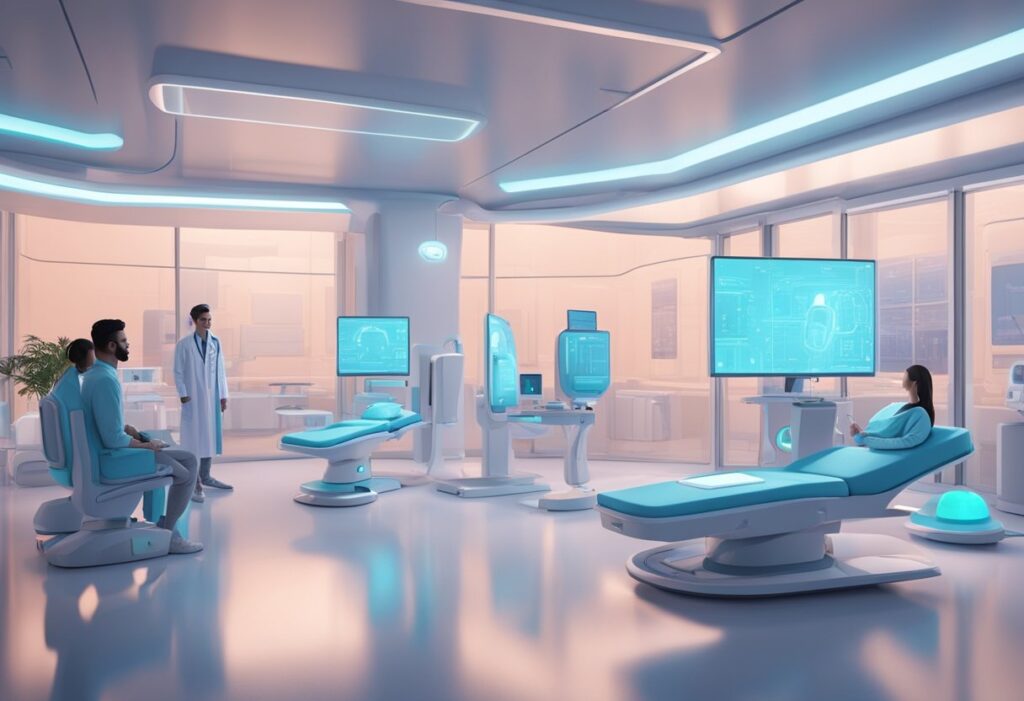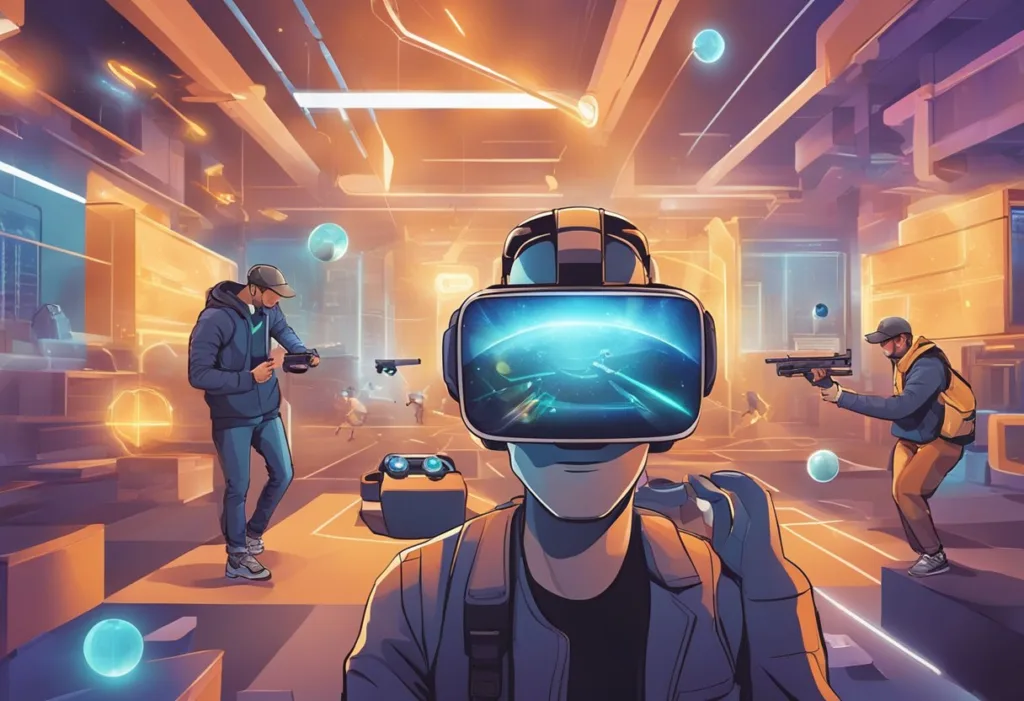The intersection of metaverse and healthcare has opened up new possibilities in the healthcare industry. Metaverse involves the convergence of three major technological trends: virtual reality, augmented reality, and the internet of things. Together, these technologies could create entirely new channels for healthcare delivery and patient care. Healthcare providers are exploring the potential of metaverse to improve patient outcomes, reduce costs, and increase access to care.
Metaverse in healthcare is an innovation that is transformational in nature. Virtual reality, for instance, can be used to simulate medical procedures and train healthcare professionals, while augmented reality can be used to provide real-time information about patients during surgery. The use of metaverse in healthcare can also help improve patient engagement and education, leading to better health outcomes. However, there are also challenges associated with metaverse healthcare, such as data privacy and security concerns, as well as the need for regulatory compliance.
Key Takeaways
- Metaverse in healthcare is a transformative innovation that can improve patient outcomes, reduce costs, and increase access to care.
- The use of metaverse in healthcare can improve patient engagement and education, leading to better health outcomes.
- However, there are challenges associated with metaverse healthcare, such as data privacy and security concerns, as well as the need for regulatory compliance.
The Intersection of Metaverse and Healthcare

Understanding the Metaverse in Healthcare
Metaverse is the collective virtual shared space created by the convergence of physical and virtual reality. The metaverse has the potential to revolutionize healthcare by offering immersive experiences, virtual environments and digital twins. Healthcare providers can use these technologies to improve patient outcomes, enhance care delivery, and promote innovation in the healthcare sector. The metaverse can also be used to create a virtual training environment for healthcare professionals, allowing them to practice and learn new skills in a safe and controlled setting.
Role of Virtual Reality and Augmented Reality in Healthcare
Virtual Reality (VR) and Augmented Reality (AR) are two technologies that are transforming the healthcare sector. VR can be used to create immersive environments that simulate real-life scenarios, allowing healthcare providers to train and practice in a controlled setting. AR can be used to overlay digital information onto the real world, providing healthcare providers with real-time information during procedures. These technologies have the potential to improve patient outcomes, enhance care delivery, and reduce healthcare costs.
Impact of Extended Reality on Healthcare
Extended Reality (XR) is a term used to describe the combination of VR, AR, and Mixed Reality (MR). XR has the potential to revolutionize healthcare by offering immersive experiences, virtual environments, and digital twins. XR can be used to create virtual training environments for healthcare professionals, allowing them to practice and learn new skills in a safe and controlled setting. XR can also be used to provide patients with virtual consultations, reducing the need for in-person visits and improving access to care.
The Potential of Digital Twins in Healthcare
Digital twins are virtual replicas of physical objects or systems. In healthcare, digital twins can be used to create virtual models of patients, allowing healthcare providers to simulate and test treatments before implementing them in the real world. Digital twins can also be used to monitor patient health in real-time, providing healthcare providers with valuable information that can be used to improve care delivery. The use of digital twins in healthcare has the potential to improve patient outcomes, enhance care delivery, and promote innovation in the healthcare sector.
Overall, the metaverse has the potential to revolutionize healthcare by offering immersive experiences, virtual environments, and digital twins. These technologies have the potential to improve patient outcomes, enhance care delivery, and promote innovation in the healthcare sector. Healthcare providers should embrace these technologies and explore their potential to transform the healthcare industry.
Applications and Challenges in Metaverse Healthcare

Clinical Applications and Patient Care
The use of metaverse technology in healthcare has the potential to revolutionize patient care. Telemedicine and telehealth are two areas where the metaverse can be particularly useful. Patients can receive medical care from anywhere in the world, and doctors can monitor their patients remotely, reducing the need for in-person visits. The metaverse can also facilitate the development of personalized treatment plans for patients.
However, there are challenges that need to be addressed. Medical professionals need to be trained to use the technology effectively, and healthcare organizations need to ensure interoperability and connectivity between different systems. There are also concerns about patient privacy and compliance with regulations.
Education and Training in the Metaverse
The metaverse can also be used for medical education and training. Medical professionals can use the technology to gain a better understanding of surgical procedures, medical imaging, and clinical trials. The technology can also be used to simulate medical emergencies and help medical professionals develop the necessary skills to handle them.
However, there are challenges to using the metaverse for medical education and training. Medical professionals need to be trained to use the technology effectively, and healthcare organizations need to ensure interoperability and connectivity between different systems. There are also concerns about the accuracy of the simulations and the quality of the training.
Challenges and Ethical Considerations
There are several challenges and ethical considerations associated with the use of the metaverse in healthcare. One of the main challenges is ensuring that the technology is accessible to everyone, regardless of their location or socioeconomic status. There are also concerns about the accuracy of diagnoses and treatment plans developed using the technology.
Privacy is another major concern. Patients need to be assured that their personal and medical information is secure and protected. Healthcare organizations also need to ensure compliance with regulations such as HIPAA.
Overall, the use of the metaverse in healthcare has the potential to transform the way medical professionals work and patients receive care. However, there are challenges that need to be addressed to ensure that the technology is used effectively and ethically.
The Future of Metaverse in Healthcare

Emerging Technologies and Future Prospects
The future of healthcare is being shaped by emerging technologies such as virtual health, virtual hospitals, avatars, simulations, therapeutics, NFTs, haptics, haptic sensors, extended reality, digital twins, artificial intelligence, cloud, IoT, XR, AR, VR, data management, and analytics. The metaverse has the potential to enhance these technologies and revolutionize healthcare. The use of avatars in healthcare simulations, for example, can improve medical training and reduce the need for physical equipment.
The Role of Blockchain and Cryptocurrencies
Blockchain and cryptocurrencies have the potential to transform healthcare by enabling secure and transparent data management, engaging socializing, commerce, telemedicine, payment, and insurance. The use of blockchain can help in data sharing, reducing costs, and increasing the accuracy of medical records. Cryptocurrencies can be used to facilitate payments and reduce the need for intermediaries.
Healthcare Revolution through Metaverse
The metaverse has the potential to revolutionize healthcare by providing a platform for engaging socializing, commerce, telemedicine, payment, and insurance. The COVID-19 pandemic has accelerated the adoption of telemedicine, and the metaverse can enhance this by providing a more immersive and engaging experience. The use of XRHealth and other metaverse technologies can improve patient outcomes and reduce costs. The metaverse can also facilitate the development of new drugs, medical devices, and therapies by enabling virtual clinical trials and reducing the need for physical testing.
The future of healthcare in the metaverse is promising, and it is expected to transform the industry in the coming years. Healthcare providers, biopharma, medtech, life sciences, equipment, hardware, and software companies should embrace this technology to stay ahead of the curve. The metaverse can provide a more engaging and immersive experience for patients and healthcare professionals alike, and it has the potential to revolutionize the industry.
Frequently Asked Questions

What are some potential benefits of incorporating metaverse technology into healthcare?
Metaverse technology has the potential to revolutionize healthcare in many ways. One of the most significant benefits is the ability to provide virtual care to patients, especially those in remote or underserved areas. Additionally, metaverse technology can help improve medical education, enhance health and wellness experiences, and provide new ways to conduct clinical trials.
How can metaverse technology improve medical education?
Metaverse technology can provide a more immersive and interactive learning experience for medical students. Virtual simulations can help students practice procedures and gain experience in a safe environment. Additionally, metaverse technology can provide access to medical experts from around the world, allowing students to learn from the best in their field.
What are the current limitations of using metaverse technology in clinical trials?
One of the main limitations of using metaverse technology in clinical trials is the lack of standardization in the industry. Additionally, there are concerns about the accuracy and reliability of virtual data compared to real-world data. However, as the technology continues to develop, these limitations are likely to be addressed.
In what ways can metaverse technology enhance health and wellness experiences?
Metaverse technology can provide new ways for patients to manage their health and wellness. For example, virtual reality experiences can help patients manage pain and anxiety, while telemedicine can provide convenient access to healthcare services. Additionally, metaverse technology can provide new ways for patients to track their health data and monitor their progress.
What role do you see metaverse technology playing in the future of healthcare?
Metaverse technology is likely to play an increasingly important role in the future of healthcare. As the technology continues to develop, it has the potential to transform the way healthcare is delivered, making it more accessible, efficient, and patient-centered. Additionally, metaverse technology can provide new ways to conduct research and develop new treatments.
How can metaverse technology be used to improve patient outcomes in hospitals?
Metaverse technology can provide new ways to monitor patients, manage their care, and improve their outcomes. For example, virtual reality experiences can help patients manage pain and anxiety, while telemedicine can provide convenient access to healthcare services. Additionally, metaverse technology can provide new ways for patients to track their health data and monitor their progress.
How is metaverse being used in healthcare?
Metaverse technology is being used in healthcare in a variety of ways. For example, telemedicine is providing convenient access to healthcare services, while virtual reality experiences are helping patients manage pain and anxiety. Additionally, metaverse technology is being used to conduct research and develop new treatments.
What is a metaverse in a hospital?
A metaverse in a hospital is a virtual environment that allows patients to interact with healthcare providers and access healthcare services. This can include virtual consultations, virtual reality experiences, and telemedicine.
What is Meta doing in healthcare?
Meta, the company formerly known as Facebook, is exploring ways to incorporate metaverse technology into healthcare. This includes developing virtual reality experiences for patients and healthcare providers, as well as exploring ways to use the technology to conduct clinical trials and develop new treatments.
How could the metaverse change the world of medicine?
The metaverse has the potential to transform the world of medicine in many ways. It can provide new ways to deliver healthcare services, conduct research, and develop new treatments. Additionally, metaverse technology can help improve medical education, enhance health and wellness experiences, and provide new ways to manage patient care.














